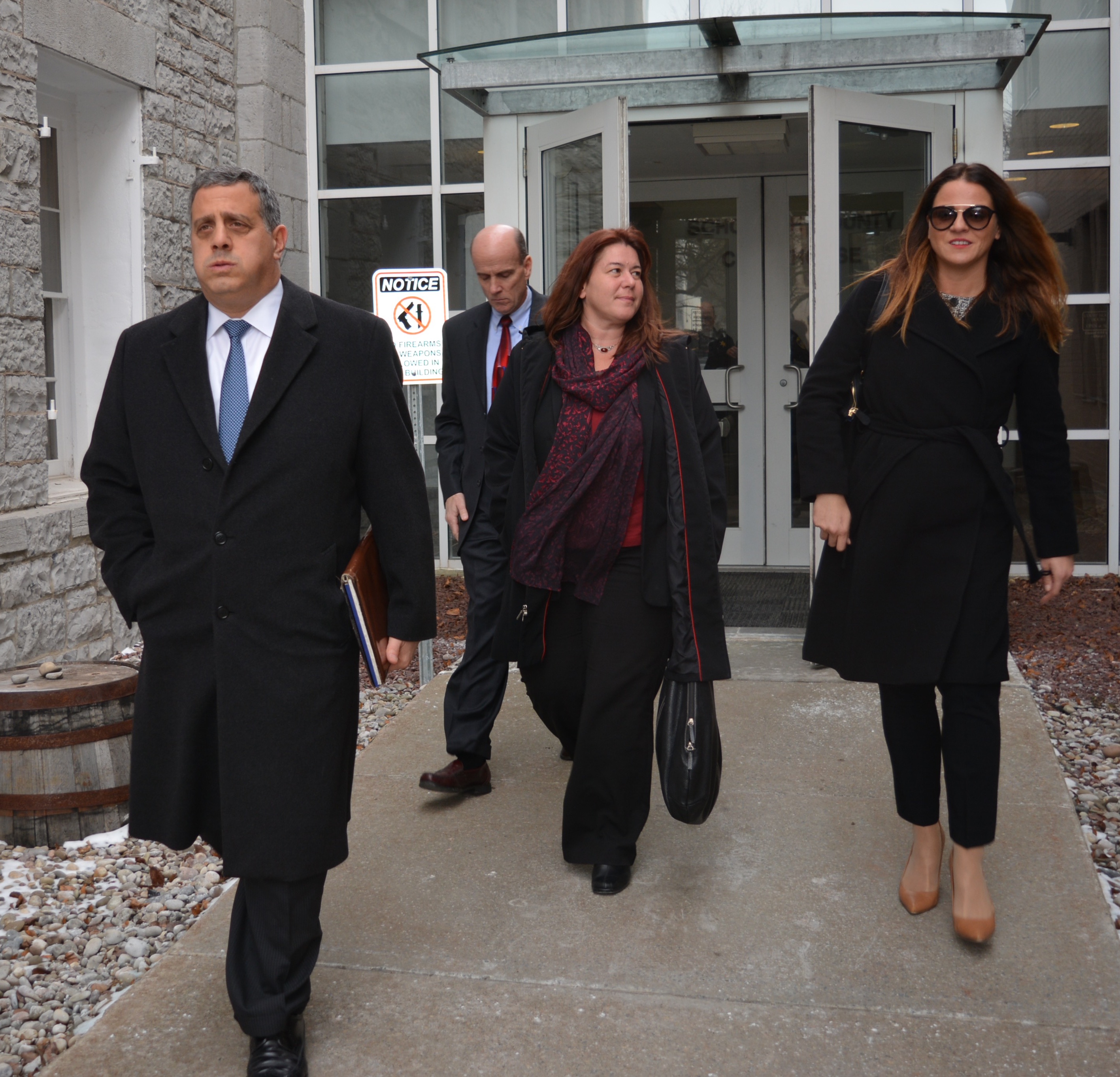
Calvin Harris, in the back, exits the Schoharie County Courthouse on Wednesday with his attorneys Bruce Barket (left), and Donna Aldea and Aida Leisenring on the right. Wednesday’s brief conference in Schoharie concluded with a March 28 date set for Calvin Harris’ fourth trial. (Photo by Wendy Post)
On Wednesday, Calvin Harris arrived at the courthouse in Schoharie County with his attorneys for a conference regarding his second-degree murder trial. Following a brief conference in chambers with the attorneys, prosecutor and the judge, a date of March 28 was placed on the calendar for what will be Calvin Harris’ fourth trial.
Calvin Harris, a Tioga County, N.Y. businessman from Spencer, N.Y., is charged with second-degree murder in the disappearance of his estranged wife, Michele Harris, in 2001.
Calvin Harris has been tried three times already for these charges, with the first guilty verdict in Tioga County overturned, the second guilty verdict was thrown out on appeals, and a third trial, held in Schoharie County last year, ended up in a hung jury.
Now, Calvin Harris will be tried again with a date by a new judge, Supreme Court Justice Richard Mott, set for March 28 in Schoharie. Supreme Court Justice Mott is a democrat and one time public defender from Columbia County. Judge George Bartlett III presided over the last trial in Schoharie, and then stepped down because of his caseload.
The attorneys from Barket Marion Epstein and Kearon, LLP, will continue to represent Calvin Harris in this case, with District Attorney Kirk Martin, from Tioga County, N.Y. prosecuting.
On Wednesday, Calvin Harris sat alone near the judge’s chambers as the team of attorneys, along with the prosecution, convened privately to discuss the parameters of the upcoming trial with the new trial judge.
The conference lasted approximately one hour, and little details were given surrounding the conference except for the upcoming trial date.
Following the conference, defense attorney Bruce Barket said very little, only noting that they are ready to try the case, and that this trial is not expected to be as long as last year’s third trial. The 2015 trial spanned through 11 weeks of testimony, and 11 days of deliberations before ending in a deadlock, or hung jury.
Calvin Harris’ wife disappeared sometime during the evening of Sept. 11, 2001 and the morning of Sept. 12, 2001. Neither the body of Michele Harris or a murder weapon has ever been found.
Calvin Harris was indicted in 2005, and in 2007 the first second-degree murder trial took place in Tioga County. That trial saw three weeks of testimony and four hours of deliberations, and the jury found Calvin Harris guilty.
But a farmer, Kevin Tubbs, came forward after the first verdict was rendered — stating he saw what appeared to be Michele Harris at the end of their driveway on Hagadorn Hill on the morning of Sept. 12, 2001, and she was arguing with a man that wasn’t Calvin Harris.
The judge at that time, Judge Martin Smith, held a credibility hearing, and determined Kevin Tubbs was credible. The judge then allowed his testimony to be entered, and the verdict was overturned.
In 2009, another trial was held in Tioga County that lasted five weeks, and saw 10 hours of deliberations. The verdict — guilty. Judge James Hayden presided.
This time Calvin Harris was sent to the Auburn Correctional Facility where he spent three years until an appellate court overturned the conviction and ordered a new trial.
A change of venue was granted, and in 2015 the third trial began in Schoharie County. This trial spanned through 11 weeks of testimony, and 11 days, or 57 hours and 15 minutes of deliberations before ending in a deadlock, or hung jury.
Now, a fourth trial will take place in Schoharie County in the spring, with Supreme Court Justice Richard Mott presiding.


